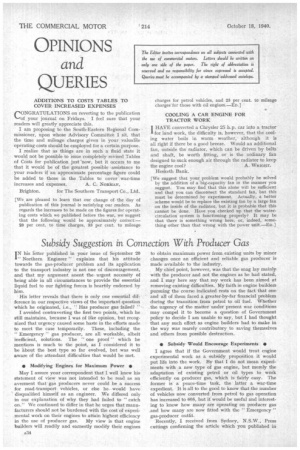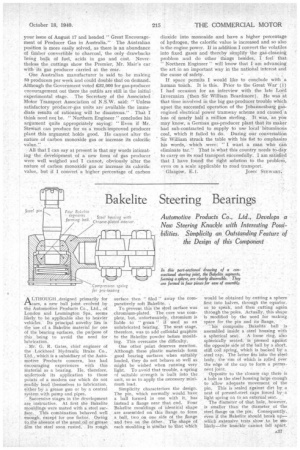Subsidy Suggestion in Connection With Producer Gas
Page 68

Page 71

If you've noticed an error in this article please click here to report it so we can fix it.
I N his letter published in your issue of September 20 "Northern Engineer " explains that his attitude towards the gas-producer problem and its application to the transport industry is not one of discouragement, and that my argument anent the urgent necessity of being able in all circumstances to provide the essential liquid fuel to our fighting forces is heartily endorsed by him.
His letter reveals that there is only one essential difference in our respective views of the important question which he originated, i.e., .! Has producer gas failed? "
I avoided contraverting the first two points, which he still maintains, because I was of like opinion, but recognized that urgency caused some haste in the efforts made to meet the case temporarily. These, including the " Emergency " gas producer, are all workable, albeit inefficient, solutions. The "one proof" which he mentions is much to the point,. as I considered it to be about the best type so far evolved, but was well aware of the attendant difficulties that would be met.
s Modifying Engines for Maximum Power •
May I assure your correspondent that I well knew his statement of view was not intended to be read as an averment that gaS producers never could be a success. for road-transport vehicles, or else he would have \ disqualified himself as an engineer. We differed only in our explanation of why they had failed to "catch on." We continued to differ in that he urges that manufacturers should not be burdened with the cost of experimental work on their engines to attain highest efficiency in the use of producer gas. My view is that engine builders will readily and earnestly modify their engines to obtain maximum power from existing units by minor changes once an efficient and reliable gas producer is made available to the industry.
My chief point, however, was that the snag lay mainlywith the producer and not the engines as he had stated,. and I may here say that my work has been aimed at removing existing difficulties. My faith in engine builders pursuing the course indicated rests on the fact that one and all of them faced a greater-by-far financial problem during the transition from petrol to oil fuel. . Whether the urgency of the matter under present war conditions may compel it to become a question of Government policy to decide I am unable to say, but I had thought that any such effort as engine builders had to make in the way was merely contributory to saving themselves and others from possible destruction.
• Subsidy Would Encourage Experiments •
I agree that if the Government would treat engine experimental work as a subsidy proposition it would put life into the work. By that I do not mean experiments with a new type of gas engine, but Merely the adaptation of existing petrol or oil types to work efficiently on producer gas, which is fairly easy. The former is a peace-time task, the latter a war-time expedient. It is all to the good to know that the number of vehicles now converted from petrol to gas operation has increased to 605, but it would be useful and interesting .to know how many are operating on producer gas and how many are now fitted with the " Emergency" gas-producer outfit.
Recently, I received from Sydney, N.S.W., Press cuttings confirming the article which you published in your issue of August 17 and headed "Great Encourage.= ment of Producer Gas in Australia." The Australian position is more easily solved, as there is an abundance of timber convertible to charcoal, the only drawbacks being bulk of fuel, acids in gas and cost. Nevertheless the cuttings show the Premier, Mr. Mair's car withi its gas producer carried at the rear.
One Australian manufacturer is said to be making SO producers per week and could double that on dernand.. Although the Government voted £32,000 for gas-producer encouragement out there the outfits are still in the initial experimental stage. The Secretary of the Associated Motor Transport Association of N.S.W. said: " Unless satisfactory producer-gas units areavailable the immediate results of rationing will be disastrous." That I think need not be. "Northern Engineer" concludes his argument quite appropriately saying: " Even if Mr. Stewart can produce for us a much-improved producer plant this argument holds good. He cannot alter the nature of carbon monoxide gas or increase its calorific value." .
. All that I can say at present is that my words intimating the development of a new form of as producer were well weighed and I cannot, obviously alter the nature of carbon monoxide gas or increase its calorific value, but if I convert a higher percentage of carbon dioXide into monoxide and have a higher percentage of hydrogen, the calorific value is increased and so also is the engine power. If in addition I convert the volatiles into fixed gases and thereby simplify the gaa-cleaning problem and do other things besides I foci: that " Northern Engineer" will know that I am advancing the art in an important way in the national interest and the cause of safety.
If space permits I would like to conclude with a human touch. It is this. Prior to the Great War (1)
had occasion for an interview with the late Lord Invernairn (then Sir William Beardmore). He waSat that time involved in the big gas-producer trouble whieh upset the successful operation of the Johannesburg gasengined electrical power tramway scheme and caused -a loss Of nearly half a million sterling. It was, as you may know, a German gas-producer plant that its maker had sub-contracted to supply to use local bituminous coal, which it failed to do. During our conversation Sir William struck the table with his fist to emphasize his words, which were: " I want a man who Can eliminate tar." That is what this country needs to-day to carry on its road transport successfully. I am satisfied that I have .found the right solution to the problern, even on a scale applicable to road transport.
Glasgow, E.1. JOHN STEWART.




































































































